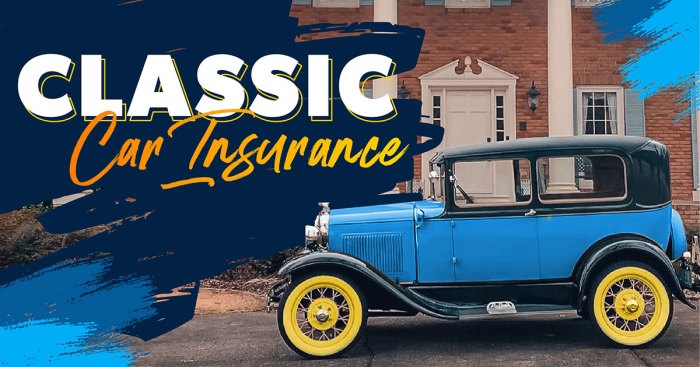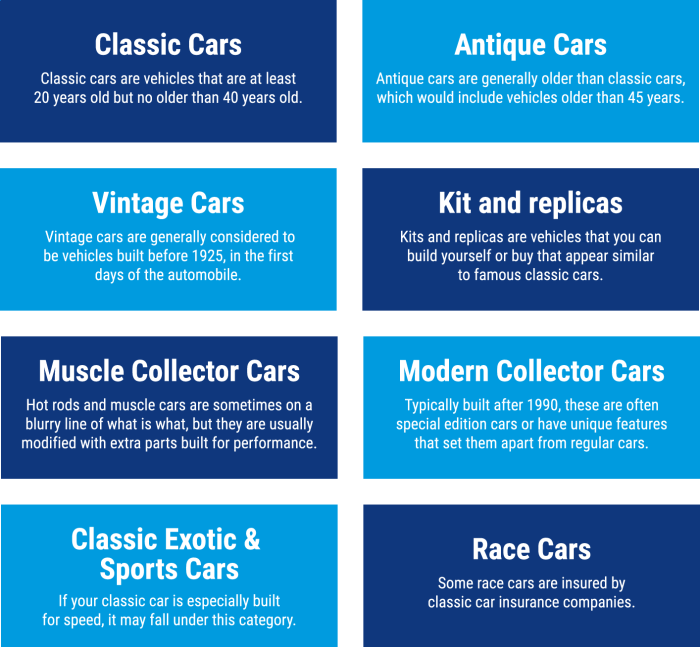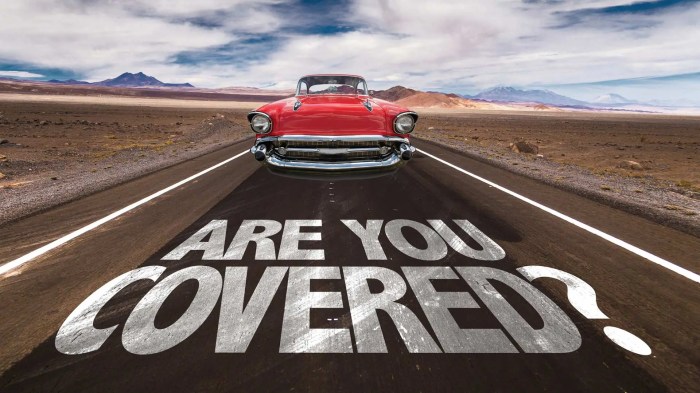Classic car insurance sets the stage for this enthralling narrative, offering readers a glimpse into a story that is rich in detail and brimming with originality from the outset. It’s not your average car insurance; it’s a specialized world designed to protect the unique value and history of your beloved classic.
Imagine a world where your prized 1967 Mustang isn’t just a vehicle, it’s a time capsule, a piece of art, and a symbol of your passion. Classic car insurance understands this. It’s tailored to the specific needs of classic car owners, offering coverage that goes beyond the typical collision and liability.
Think of it as a shield for your dream ride, protecting it from the unexpected.
What is Classic Car Insurance?
Classic car insurance is a specialized type of insurance designed to protect your cherished vintage or antique vehicle. Unlike regular car insurance, classic car insurance considers the unique value and characteristics of these vehicles, offering tailored coverage and benefits.
Differences from Regular Car Insurance
Classic car insurance differs significantly from regular car insurance in several key aspects.
- Valuation:Classic car insurance typically uses an agreed value for your vehicle, reflecting its current market value or restoration costs. This agreed value is used to determine the payout in case of a total loss. In contrast, regular car insurance uses the actual cash value (ACV), which is the vehicle’s depreciated value, potentially leaving you with a significant financial loss if your classic car is totaled.
- Usage:Classic car insurance policies often restrict the usage of your vehicle, limiting it to special events, rallies, or pleasure driving. This is because classic cars are generally driven less frequently than modern vehicles, reducing the risk of accidents.
- Coverage:Classic car insurance policies often include specialized coverage options not typically found in regular car insurance. These may include coverage for restoration costs, agreed value replacement, and even coverage for spare parts or accessories.
Benefits of Classic Car Insurance
Classic car insurance offers several benefits that cater to the specific needs of classic car owners.
- Financial Protection:Agreed value coverage ensures you receive a fair payout if your classic car is totaled, reflecting its true value rather than its depreciated value. This protects your investment and provides financial security in the event of an accident or theft.
- Peace of Mind:Knowing your classic car is insured with a policy designed specifically for its unique needs provides peace of mind. You can enjoy driving your vehicle without worrying about potential financial risks.
- Specialized Coverage:Classic car insurance often includes coverage options tailored to the needs of vintage vehicles. This can include coverage for restoration costs, agreed value replacement, and coverage for spare parts or accessories. This ensures that you are fully protected in the event of an accident or theft.
Eligibility Criteria for Classic Car Insurance

Classic car insurance isn’t just for any old vehicle. To qualify for this specialized coverage, your car needs to meet certain criteria that define it as a classic. These criteria ensure that the car is of historical significance and requires specialized coverage to protect its unique value.
Age Requirements
To be considered a classic car for insurance purposes, the vehicle typically needs to be a certain age. While the specific age requirement can vary depending on the insurance company, most insurers consider vehicles at least 20 years old to be eligible for classic car insurance.
This age requirement reflects the general understanding that a vehicle becomes a classic after a significant period of time has passed, establishing its historical significance.
Coverage Options for Classic Car Insurance
Classic car insurance offers various coverage options to safeguard your prized possession. These options are designed to protect your vehicle from different risks, ensuring peace of mind while you enjoy your classic car. Let’s explore these options in detail.
Collision Coverage
Collision coverage protects your classic car from damage caused by an accident, regardless of who is at fault. This coverage helps pay for repairs or replacement of your vehicle if it collides with another vehicle, an object, or even if it rolls over.
For example, if your classic car is involved in a collision with a tree while driving on a slippery road, collision coverage would help cover the repair costs.
Classic car insurance isn’t just about protecting your shiny vintage beauty from a fender bender. It’s about safeguarding your passion, your investment, and your peace of mind. Think about it, restoring a classic car can be a labor of love, and that love often involves specialized skills.
That’s where Professional liability insurance comes in, offering a safety net for those who work on these precious vehicles, protecting them from potential claims related to their expertise. So, whether you’re a seasoned restorer or a weekend enthusiast, make sure your classic car insurance policy has you covered, both on the road and in the workshop.
Comprehensive Coverage
Comprehensive coverage safeguards your classic car from damage caused by events other than accidents. This includes risks like theft, vandalism, fire, natural disasters (like hail or floods), and even animal collisions. Imagine your classic car is parked in your garage, and a fire breaks out, causing significant damage.
Comprehensive coverage would step in to cover the repair or replacement costs.
Liability Coverage
Liability coverage is a crucial part of any car insurance policy, including classic car insurance. It protects you financially if you are responsible for causing an accident that injures another person or damages their property. For example, if you accidentally hit another car while driving your classic car, liability coverage would help pay for the other driver’s medical expenses, vehicle repairs, and any other related costs.
Agreed Value Coverage
Agreed value coverage is a specialized type of coverage specifically designed for classic cars. It allows you and your insurance company to agree on a specific value for your vehicle at the time you purchase the policy. This agreed-upon value is then used to determine the payout if your classic car is totaled or stolen.
This is crucial for classic cars, as their value can fluctuate significantly based on their condition, rarity, and historical significance. For instance, if your classic car is valued at $50,000, and it’s totaled in an accident, agreed value coverage ensures you receive a payout of $50,000, regardless of its market value at the time of the incident.
Factors Affecting Classic Car Insurance Premiums

Your classic car is more than just a vehicle; it’s a piece of history, a symbol of style, and a passion project. When it comes to insurance, classic cars are treated differently than modern vehicles. Several factors determine the premium you’ll pay, and understanding these factors can help you make informed decisions about your coverage.
Vehicle Make, Model, and Year
The make, model, and year of your classic car are key factors influencing your insurance premium. These factors determine the vehicle’s value, its rarity, and its potential for repair costs. For instance, a rare 1960s sports car will likely command a higher premium than a common 1980s sedan, even if both are in excellent condition.
Vehicle Value
The value of your classic car is directly related to your insurance premium. The higher the value, the more expensive your coverage will be. This is because insurers need to cover the cost of replacing or repairing your car if it’s damaged or stolen.
To determine the value of your classic car, you can consult with an appraiser or use online resources that provide valuations for classic cars.
Driver’s Age, Driving History, and Location
Like any other insurance policy, your driving record and location also play a role in determining your classic car insurance premium. Insurers consider your age, driving history, and the location where you store your car. Drivers with a clean driving record and a history of safe driving will typically qualify for lower premiums.
Similarly, drivers residing in areas with higher rates of theft or accidents may pay higher premiums.
Usage and Storage Conditions
The frequency of your car’s use and its storage conditions are also important factors in premium calculation. Classic cars that are driven frequently or stored in high-risk areas may have higher premiums. Insurers understand that cars driven regularly are more likely to be involved in accidents, while those stored in secure locations are less likely to be stolen or damaged.
Finding the Right Classic Car Insurance Policy
Finding the right classic car insurance policy can be a rewarding experience, ensuring your beloved vehicle is protected against unforeseen circumstances. It involves a thorough research process and careful consideration of various factors. This section will guide you through the process of finding the perfect insurance policy for your classic car.
Researching and Comparing Providers
Before settling on a classic car insurance policy, it is crucial to explore various providers and compare their offerings.
- Start with online searches:Utilize search engines like Google or Bing to find classic car insurance providers in your area. Look for websites with comprehensive information about their policies, coverage options, and customer reviews.
- Check industry directories:Websites like the Insurance Information Institute (III) or the National Association of Insurance Commissioners (NAIC) provide directories of licensed insurance companies. These resources can help you find reputable providers in your state.
- Seek recommendations:Connect with fellow classic car enthusiasts or members of car clubs. They might have valuable insights and recommendations for insurance providers specializing in classic cars.
- Contact multiple providers:Once you have a shortlist of potential providers, contact them directly. Discuss your specific needs, ask questions about their policies, and request quotes.
Factors to Consider When Choosing a Policy
Choosing the right classic car insurance policy involves carefully evaluating various factors.
- Coverage options:Determine the level of coverage you need, including comprehensive, collision, and liability insurance. Consider factors like your car’s value, your driving habits, and your financial situation.
- Deductibles:Deductibles represent the amount you pay out-of-pocket before your insurance kicks in. A higher deductible usually translates to lower premiums. Carefully assess your risk tolerance and financial capabilities when choosing a deductible.
- Premiums:Premiums are the cost of your insurance policy. Compare premiums from different providers to find the best value for your coverage needs. Consider factors like your car’s age, make, and model, your driving history, and your location.
- Customer service:Choose a provider with a strong reputation for customer service. Look for companies with responsive customer support, clear communication, and a history of resolving claims fairly and efficiently.
- Claims process:Understand the claims process and how it works. Ensure the provider has a streamlined process for reporting and settling claims. Check for any specific requirements or documentation needed.
Benefits of Working with Specialized Classic Car Insurance Brokers
Specialized classic car insurance brokers possess in-depth knowledge and expertise in the unique needs of classic car owners.
- Personalized service:Brokers take the time to understand your specific requirements and recommend policies tailored to your classic car and driving habits.
- Access to multiple providers:Brokers have relationships with various insurance companies, allowing them to compare policies and find the best options for you.
- Negotiation power:Brokers can leverage their expertise and relationships to negotiate favorable premiums and coverage terms on your behalf.
- Claim assistance:Brokers can assist you with the claims process, ensuring a smooth and efficient experience.
Managing Classic Car Insurance

Keeping your classic car insurance policy in good standing is crucial for protecting your investment and ensuring you have the necessary coverage in case of an accident or unforeseen event. By proactively managing your policy, you can avoid gaps in coverage, maintain optimal premiums, and streamline the claims process if needed.
Regularly Reviewing Coverage Needs
It’s important to regularly review your classic car insurance policy to ensure it still meets your needs. As your car ages, its value may fluctuate, and your driving habits may change. You may also need to update your coverage if you make modifications to your vehicle or use it for different purposes.
For example, if you decide to participate in car shows or rallies, you may need to add additional coverage for events.
Notifying the Insurer of Changes
Promptly inform your insurer about any changes that affect your policy, such as:
- Changes in vehicle usage: If you start using your classic car more frequently or for different purposes, your insurer needs to know. For example, if you begin using your car for daily commuting, your premiums may increase.
- Changes in storage: If you change where you store your car, such as moving it to a different garage or leaving it outdoors, your insurer should be notified. This can impact your risk profile and potentially affect your premiums.
- Modifications to the vehicle: Any modifications you make to your classic car, such as adding performance parts or upgrading the engine, could affect your insurance coverage and premiums. Make sure your insurer is aware of these changes.
- Changes in your address or contact information: It’s essential to keep your insurer updated on any changes to your address or contact information to ensure you receive important policy updates and communication.
Understanding the Claim Process, Classic car insurance
Familiarize yourself with the claim process for your classic car insurance policy. This will help you navigate the process smoothly if you need to file a claim.
- Know your policy details: Carefully read your policy documents to understand your coverage limits, deductibles, and any specific procedures for filing a claim. This will help you prepare the necessary information and documentation.
- Report the claim promptly: Contact your insurer as soon as possible after an accident or incident that may require a claim. Prompt reporting helps expedite the process and ensures proper documentation.
- Gather necessary documentation: Collect all relevant information and documentation, such as police reports, witness statements, photos of the damage, and repair estimates. This will help support your claim and facilitate a faster resolution.
- Follow the insurer’s instructions: Carefully follow the instructions provided by your insurer throughout the claim process. This may involve providing additional information, attending inspections, or signing necessary forms.
Keeping Accurate Records of Vehicle Maintenance and Repairs
Maintaining comprehensive records of your classic car’s maintenance and repairs is crucial for several reasons:
- Documentation for insurance claims: In the event of an accident or damage, detailed records of your car’s maintenance history can help support your insurance claim and demonstrate proper care of the vehicle. For example, if you need to file a claim for engine damage, having records of regular oil changes and tune-ups can help establish that the damage wasn’t caused by neglect.
- Evidence of value: Maintaining accurate records of repairs and restoration work can help substantiate the value of your classic car, which is particularly important for insurance purposes. This documentation can be used to support a claim for total loss or to negotiate a fair settlement.
- Historical documentation: Maintaining records of your car’s history can be valuable for future owners or collectors. These records can provide insights into the vehicle’s past and help preserve its heritage.
“Accurate and detailed records are essential for managing your classic car insurance effectively. They can help you avoid coverage gaps, streamline the claims process, and demonstrate the value of your vehicle.”
Final Conclusion
So, if you’re lucky enough to own a classic car, don’t leave its protection to chance. Classic car insurance is your key to peace of mind, allowing you to enjoy your vintage beauty without worry. It’s about more than just coverage; it’s about safeguarding a piece of history, a symbol of your passion, and a legacy you can cherish for years to come.
Quick FAQs
What if my classic car is damaged while being transported?
Many classic car insurance policies offer coverage for damage during transport, but it’s crucial to check the specifics of your policy. Some may require you to use a specific transporter or have additional coverage for transport.
How do I prove the value of my classic car for insurance purposes?
You’ll need to provide documentation like appraisals, auction results, or historical market data to demonstrate the value of your car. It’s a good idea to have a professional appraisal done to ensure your car is properly valued.
Can I use my classic car for daily driving with classic car insurance?
While some policies allow limited daily driving, others are designed for occasional use. Be sure to discuss your intended usage with your insurer to ensure your policy meets your needs.